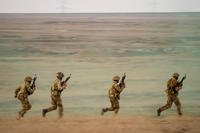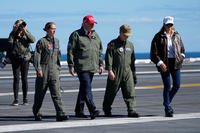Russia, China, North Korea, Iran and ISIS all pose threats, but the "biggest strategic danger" to U.S. national security would be a return to the arbitrary budget caps of the sequester process, Defense Secretary Ashton Carter said Thursday.
"If the bipartisan budget agreement were to fall apart, as everyone has said, that is our biggest strategic danger because that would affect in future years our ability to recover full-spectrum readiness," Carter said in testimony to the Senate Armed Services Committee on the proposed DoD budget for Fiscal Year 2017.
"That is the greatest risk to the Department of Defense -- the reversion to sequestration. We very much hope to avoid that," said Carter, who testified with Joint Chiefs Chairman Gen. Joseph Dunford in support of the Obama administration's proposed defense budget of $583 billion -- $524 billion in the base budget and $59 billion in the war fund for Overseas Contingency Operations.
As they have previously, Carter and Dunford said that Russia, China, North Korea, Iran and the Islamic State of Iraq and Syria all posed main threats, adding that those threats would possibly go unchallenged if the budget caps of the 2011 Budget Control Act returned in 2018.
Sen. John McCain, an Arizona Republican and the Committee's chairman, argued for more defense spending this year. He called the military "undersized, unready and underfunded to meet the current and future threats."
Dunford said that the proposed budget was adequate, but McCain noted that Dunford's predecessor as JCS chairman, now-retired Army Gen. Martin Dempsey, said last year that the military was at the "lower ragged edge" of readiness.
Since then, the military has cut 24 Blackhawk helicopters, 50 F-35 Joint Strike Fighters, five Navy cruisers, and 77 Marine Corps Joint Light Tactical Vehicles while also trimming $1.3 billion in military construction and family housing, McCain said.
"The unfunded requirements of the military services now total nearly $18 billion," McCain said. "That represents the additional ships, airplanes, helicopters, fighting vehicles, training and other programs that our military leaders say they need simply to carry out our increasingly antiquated defense strategy at an acceptable level of risk."
"So now you're satisfied with the level -- it is hard for us to understand, general," McCain told Dunford.
In response, Dunford said that "By no means have I said the resource level for the department as we look out over the next few years is adequate. What I simply said was this year's fiscal year 2017 budget is sufficient to meet the (overall national security) strategy."
Carter disputed McCain on his estimate of $18 billion in unfunded requirements. Carter said the actual figure was $11 billion, and said the Defense Department has been able to close some of the gap because of the fall in oil prices and through cutting expenses.
Last year's bipartisan budget act gave the Defense Department "much-need stability after years of gridlock and turbulence," Carter said, but he warned that the return of sequester would take $100 billion out of defense spending in the coming years unless Congress acts to lift the caps permanently.
-- Richard Sisk can be reached at richard.sisk@military.com






























